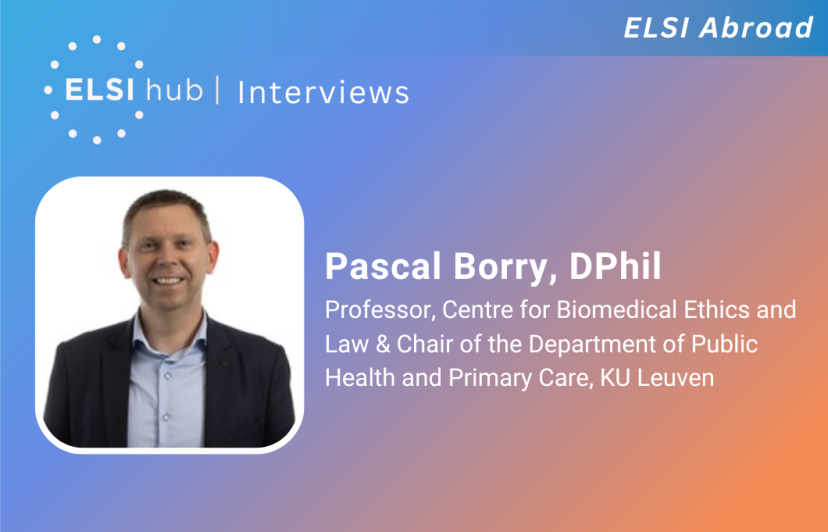
ELSI Abroad: Spotlight on Belgium
In this fourth installment of our series of interviews that aim to foster a global perspective on the ELSI field of study and inspire information sharing and collaboration across national borders, we are speaking with Pascal Borry, D.Phil., Professor of Bioethics at the Centre for Biomedical Ethics and Law (CBMER) and Chair of the Department of Public Health and Primary Care of the KU Leuven, about ELSI research in Belgium. Dr. Borry’s primary research activities are focused on the ethical aspects of human genetics, organ donation, and anti-doping and he has published more than 180 publications in peer-reviewed journals internationally. He is also director of the Master of Bioethics programme at KU Leuven, supervises doctoral projects and post-doctoral researchers, and serves as a member of the Flemish Commission on neonatal screening.
CERA: What inspired you to focus your work on the ethical, legal, and social implications of genetics and genomics?
Dr. Borry: As many things in life, I guess that a lot of things just happen or cross your path. I never imagined as a student that this would have been my road. As a teenager, I was always very much interested in justice themes and social engagement. My first studies were in French and Italian linguistics. I was attracted by French philosophers, like Jean-Paul Sartre, and French writers. I did also a master’s degree in religious studies and became involved in ethics. I graduated in 2001, which was really the period in which the Human Genome Project came together, and all the ethical questions around human genetics popped up. I got the opportunity to work on a research project focusing on the increasing possibilities of predictive testing, especially in children and adolescents.
CERA: What are you working on right now?
Dr. Borry: In recent years, a few research areas have dominated the activities in our research group. Firstly, we have several research projects related to the ethical and social aspects of human reproduction, especially expanded carrier screening, prenatal screening, and preimplantation genetic diagnosis. Secondly, we have worked intensively on questions related to incentives for data sharing. Thirdly, we are currently involved in a big research project on the use of gene therapy.
At the level of teaching, we coordinate a master of bioethics, with a course focused on the ethical aspects of human genetics. Over the more than 20 years of this programme, we have almost 350 alumni from more than 70 countries. Last year we also launched a very successful Massive Open Online Course (MOOC) on research ethics.
CERA: What can you tell us about ELSI research in Belgium?
Dr. Borry: Belgium is a relatively small country, which means we are naturally internationally oriented and focused on international developments. The European Union has, through its Horizon funding schemes, also had a big impact on the orientation of research activities. We are involved in various interdisciplinary and international consortia. Within the European Society of Human Genetics, there is an active community of ELSI scholars that present and participate in the annual meetings. There is no separate ELSI conference here, but we often present and participate in the annual conference of the European Association of Centres for Medical Ethics (EACME). In September 2026, we will organize its annual conference in Leuven, and this meeting promises to have a lot of scholars presenting their work on the ELS aspects of genetics and genomics.
CERA: What would you say is the most important ELSI issue in Belgium right now? Why do you think this is so?
Dr. Borry: Firstly, at the policy level, discussions have taken place for several years on a reform of our abortion legislation. In contrast to the debates in the United States, proposals are going in the direction of making the current legislation less restrictive, for example, by removing the current, obligatory waiting period or extending the period in which a termination of pregnancy is allowed. Secondly, discussions are taking place about surrogacy, for which a legal framework is currently lacking. Thirdly, discussions continue to take place on the model of anonymity that is still being used in gamete donation. Discussions on the possibilities of reidentification through genetic technologies are also happening, which is linked to an increase in attention to knowledge of one’s biological origin.
CERA: What ELSI issues do you see that would benefit from multi-country deliberation by ELSI scholars?
Dr. Borry: International and interdisciplinary collaborations help us to understand that values and perspectives differ, and that the cultural context is very different. It is important to be exposed to those differences and be self-critical on one’s own thinking and perspectives. Balancing these differences with transnational perspectives is important. We should be open to the world.
CERA: What three works of ELSI scholarship from Belgium would you recommend to the global ELSI community?
Dr. Borry: I would like to recommend Personalism and Medical Ethics, which is the work of my colleague, Professor Emeritus, Paul Schotsmans, in which he indicates how Christian faith can be an inspiration for an open-minded, humane, and dynamic health care. Bioethics academic scholars don’t often bring up religion in their work, although it plays an important role in policy debates. I will also recommend the Belgian Advisory Committee on Bioethics, which is an active committee that regularly publishes well-documented reports on various actual bioethical issues. It is a good resource for various policy debates.
CERA: Can you think of any online seminars, scholarly resources, or anything else that you would like us to share with the broader ELSI research community?
Dr. Borry: It is worth mentioning the yearly EACME conference. They regularly organize online seminars for their members.
CERA: Is there anything else you would like to say?
Dr. Borry: Our team regularly hosts motivated researchers that want to spend time in Leuven. Interested people can always contact me if they are interested in spending some time in the historical city of Leuven, which is only 15 minutes from Brussels, the capital of the European Union.
If you would like to be interviewed for a future installment of ELSI Abroad, please feel welcome to email us at [email protected]. Please see our other interviews in this series focused on ELSI research in Canada, Australia, and the UK.


